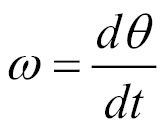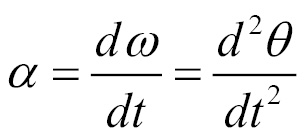Angular Velocity
With the PhysicsSystem updated, we can now simulate rigidbodies colliding in a linear fashion. This linear collision does not look realistic. To make our simulation more lifelike, we must add Linear Velocity to the rigidbodies. Every object will rotate around its center of mass. To keep the math simple, we assume that the center of mass for every object is at its world position.
In order to rotate an object, we have to store its orientation and understand the forces that affect this orientation. These forces are the Angular Acceleration, Angular Velocity, torque, and the moment of inertia. Each of these topics will be discussed in detail.
Angular Velocity and Acceleration
Angular Velocity is measured in radians per second ( ). Angular Acceleration is measured in radians per second squared (
). Angular Acceleration is measured in radians per second squared ( ) . Angular Velocity
) . Angular Velocity  is the first derivative of orientation; Angular Acceleration
is the first derivative of orientation; Angular Acceleration  is the derivative of angular velocity:
is the derivative of angular velocity:


We will store angular velocity as a vector. The direction of this...



























































